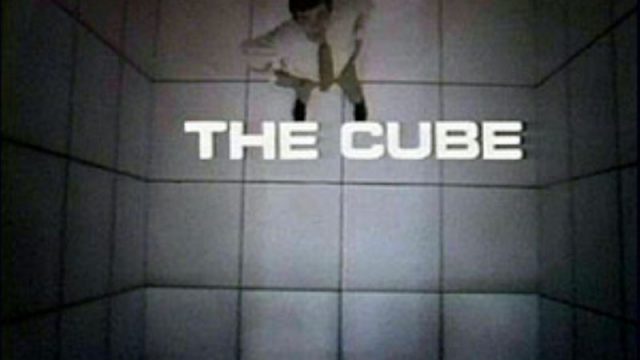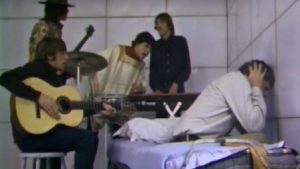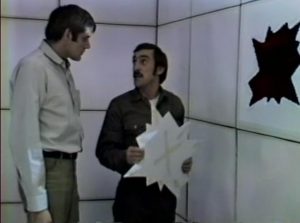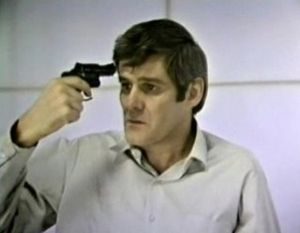Many people say that we are living through the golden era of television. They point to the recent string of smart and sophisticated cable dramas. They marvel that a show as strange and surreal as the return of Twin Peaks can exist on a premium cable network. Others say the early 1990s was the golden age, when a show as strange and surreal as Twin Peaks could thrive on network television, right alongside classics like Seinfeld and The Simpsons. Still others say it was the 1970s, when a director of the caliber of Steven Spielberg was releasing movies straight to tv. Some say the 50s, some the 40s…
In the late 1960s, still the 3 channel era, NBC decided to air a program called Experiment In Television. This would be an hour long showcase of experimental films and documentaries, presented without commercial interruption. The program was short lived — having no advertising meant it was always going to run at a loss, and even with the baby boomers in the midst of their college years, it’s hard to imagine there was ever enough demand for the concept to justify taking up a full third of all home viewing options. Most of the episodes have been lost to time. However one episode, written and directed by the great Jim Henson, remains free to view for anyone with a Filmstruck membership or a YouTube account and a lack of ethics.*
The Cube is a short surrealist teleplay with a simple premise. A man is stuck in a small room and can’t escape despite an eccentric cast of characters coming and going at will. Henson balances a tricky tone, seamlessly shifting back and forth from absurdist humor to surrealist Kafkaesque horror. The film is tense, broadly funny, philosophical, and constantly engaging. I’ll be describing the plot in quite a bit of detail here, so if you’re planning on watching the film, I suggest doing it now. If not, buckle up because things are about to get unusual.
We open on an extreme close up of a man talking into a camera. He doesn’t know where he is or what’s going on. The camera pulls out to reveal he’s in a small square room with white rectangular panels lining the walls, ceiling, and floor. There’s a strange mechanical buzzing, like the inside of a computer. A maintenance man enters and introduces himself as Arnie, and gives the man a stool, stopping first to clean some strawberry jam off of it. Arnie leaves, but when the man tries to follow he can’t find the door. A woman enters with her parents. She claims to be the man’s wife, but he doesn’t recognize her. Her mother wonders what’s wrong with him. “Drugs? Radiation? Laser beams?” They tell him to hurry up or they’ll be late to the show, but when he tries to follow them out he again can’t find the door. Another man enters claiming to be the manager. He’s affable, but unhelpful. The man questions him,
“What is this place? What is it for?”
“We ask that ourselves, sometimes”
“Is there any way out?”
“Oh yes, everyone on the managerial level got out.”
One of the things that keeps The Cube interesting is the way Henson keeps shifting the metaphor. The cube can be any confining, stifling thing. It can be a bad marriage or a bad job. The stagnation of a middle class life. The prison of middle management. The set has an industrial office style design to it, and it’s not a stretch to interpret it as a cubical. Later Henson will go deeper, the cube as culture and as self.
The manager leaves, and tells the man he can only leave through his own door. Arnie comes back and gives the man a telephone, that only calls Arnie, and a chocolate rabbit. The man has a few escape attempts, but they’re completely futile. The police enter, dressed like Nazis, and find contraband all around the room. Diamonds in the chocolate rabbit, guns under the floor, a kidnaped scientist behind a wall panel. They cuff his arms between his legs and leave with the loot, warning him not to go anywhere because they’ll be back to torture him. Next in is an interior decorator who suggests painting the room several different colors before settling on white, and since it’s already white, just a coat of shellac. Arnie sprays some deodorant around because she can’t tell the difference, and leaves. Then comes a musician who gives the man the key to the handcuffs and suggests he relax on the bed, that has just materialized, while he practices. The song starts as a pretty good Beatles knock off before getting downright punk in its second verse.
“There are places that contain you, there are corners in your soul
And plastic laminations in your life
But when you’re on the inside of the outside of your thoughts
Do they restrain? Or do you stay yourself?
Now the inside of a near place is the outside of a far,
But you can only face your space one way.
You’re really in the middle of the inside of yourself
And there’s only one thing we can say…
YOU’LL NEVER GET OUT. YOU’LL NEVER GET OUT.
YOU’LL NEVER GET OUT OF THE CUBE. IT’S SAID-
YOU’LL NEVER GET OUT. YOU’LL NEVER GET OUT.
YOU’LL NEVER GET OUT TILL YOU’RE DEAD, DEAD, DEAD…
TILL YOU’RE DEAD, DEAD, DEAD…
TILL YOU’RE DEAD, DEAD, DEAD…”
Henson always had a knack for this sort of thing. The band leaves, and the manager pops his head back in to say, “The rest period is over.” Next up is a prisoner, dressed like our man but in tattered clothes, who comes crawling through one of the bottom panels. He talks about the years of torture he endured and his miraculous escape, but almost immediately starts freaking out, wanting to return to the security of his own cube. As soon as he’s gone the manager comes in to tell us that that was an actor, and sure enough the actor comes in, complaining about how overwrought the script is. The two leave and are replaced by a beautiful woman, who asks the man to sit with her on a newly materialized couch and drink some newly materialized liquor. The woman seduces him, but as soon as they kiss, a group of doctors burst in and begin taking his vital signs as the woman complains to the nurse about having the unpleasant part of the job. The doctors turn out to be vets, and warn him to lay off the oats, before going to check on a platypus down the hall. As they leave, a well dressed film critic walks in, shakes the mans hand, and congratulates him on the show.
“Well, as I interpet what you’re doing here, this is all a very complex discussion of reality vs. illusion. The perfect subject for the television medium.”
The man objects, so the critic takes out a TV and shows him the show we’re watching, skipping right to the end credits.
“I’m still in the cube!”
“But you’re happy and healthy, you even got the girl, The perfect storybook ending”
The man on the tv starts talking, “Wait this is not a happy ending! I don’t want this girl!”
“Well, we don’t need the sound, If I were you I’d be very pleased with that ending.”
The man is not pleased, so the critic turns off the tv and disappears. Next up is a black radical. He compliments the cube and only has one problem with it, “it’s white”
“It’s nice and it’s safe and you made it and you’re going to stay in it until you die! And you’re gonna die in it. -This is a mausoleum to whiteness” Our man claims he didn’t make it, but when challenged to leave he can’t.
“You make me sick”
The cube is now beginning to represent social structures larger than just a single job or marriage. The cube is a system.
When the black man leaves, we fade into a dinner party, full of actors we’ve seen already, all discussing the show.
“It had no dramatic value, no structure at all.”
“I didn’t care for the ending”
“But What is the point of it all?”
“And on top of that they paid everybody scale”
The man tries to interact with them, but finds they are all projected on the wall.
“None of us are real. We’re all projected.” a woman tells him.
The man argues that he is real, but the camera pulls back to reveal he’s still sitting on the stool, watching a projected version of himself. The projection turns off and a panel opens up to reveal a rather grim looking man who asks, “Has it ever occured to you that maybe you have died and this is what death is?” before the panel swings back shut. A scientist enters to discuss quantum physics and to throw a hammer through the wall.
“Your trouble is, you wont accept a paradox” he tells the man.
Arnie measures the hole, determining it’s a #47, and gets the appropriate piece.
This is my favorite joke in the movie, and to be perfectly honest probably the reason I’m writing this essay at all. Just think of the logistics! It’s good we get this here, because things are about to get dark.
A young woman enters and talks with the man, getting older and more bitter as the conversation goes on. She tells him not to trust anyone, that “everyone’s a liar. I’m a liar. I’m lying right now.” Eventually she turns to an old hag and the entire wall opens up as she leaves, cackling.
The manager returns and tells the man his time is up and he needs to leave. The man is skeptical, believing it to be a trick.
“What kind of trick could it be?”
“Oh, I don’t know, maybe the minute I set foot outside this door, two gorillas grab me, dressed in ballet costumes, drag me back and throw me on the floor and dance around me singing ‘Home Sweet Home’!”
The manager talks him into leaving but the minute he sets foot outside the door, two gorillas grab him dressed in ballet costumes, drag him back and throw him on the floor and dance around him singing ‘Home Sweet Home’
“You know sir, you’re getting quite good at predicting these things”
The manager leaves and the two actors who played the cops return, now as a pair of vaudevillian comedians. They have white makeup hitting a spot somewhere between clown and corpse, and are doing a sort of uncanny valley Abbott and Costello routine to canned laughter. Then the laugh track goes dead, and they turn to the man and berate him for not laughing. When they leave a kid on a tricycle rides through, singing, “you’re never gonna get outta here. You’re never gonna get outta here” This is now a flat out horror movie.
A voice from the hall says, “You have three minutes” and a monk enters, telling the man, “I am no one. I am a vessel, a pitcher filled with the elixir of peace. I bring this gift to you.” and hanging a totem on his wall. The totem, emits a loud incessant buzzing and the man smashes it with his stool, discovering its filled with strawberry jam. Arnie pops in to clean up the mess and tells the man he can get him a new one any time he wants.
Up to now everything has been moving at a fast clip, with segments slightly overlapping and information coming fast enough to keep the audience from fully processing it, keeping us a little off balance. But now the camera hangs back and holds on the man as he curls up in a ball in the corner. The wall opens up and we see down a hallway a group of pallbearers carrying a casket. They bring it into the room, set it down, and leave. The man opens it, slowly, silently, and finds it empty. His casket? Behind him a chair has appeared, and on it a gun. He picks it up, sees its loaded, puts it to his head.
This is a movie Jim Henson made for NBC in 1969. The man pulls the trigger, and is hit with strawberry jam. The rest of the cast comes pouring out, laughing their heads off as the man breaks down. The man gathers himself and gives a big angry speech to the crowd. Says that he knows what’s real, and he knows who he is, and he walks out of the cube to their applause. A man in the hall congratulates him, says, “we didn’t think you’d get out so quickly” and asks him to step into his office to sign some paperwork. Our man is triumphant, telling the stranger that he knows who he is and that he is real. That if he hits the desk he can feel it, if he cuts himself he bleeds. He notices that he has cut himself. “Taste it.” the other instructs. The man does. It’s strawberry jam. The office fades and the man is still in the cube. We fade out on an overhead shot of the man pacing back and forth in the cube as the soundtrack plays, “You’ll never get out till you’re dead, dead, dead…”
The Cube isn’t a simple rut that can be walked out on by anyone with enough courage. The Cube isn’t even The System, cruel and uncaring as it may be, ultimately dependent on the people who make it up. No, The Cube is the self. The prison of our bodies and minds that distorts our perception. The self delusion and self destruction that defines human existence and is escapable only in death. The ending is bleak and hopeless.
Later that year Henson would join the newly launched Public Broadcasting Network and a little show called Sesame Street. That success would allow him to finally leave behind the advertising work that had supported him to this point. The Muppets would become an institution, and although his work would always have a quality of anarchy and melancholy, it would never again turn to the all-out despair of The Cube.
* Sorry banditos, looks like the law was faster than me this time.





